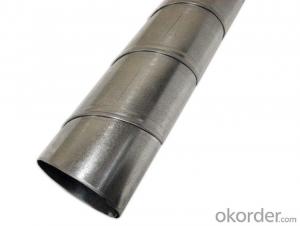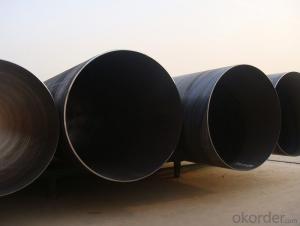SPIRAL STEEL PIPE 24’‘26‘’ 28‘’ 32‘’LARGE DIAMETER PIPE
- Loading Port:
- Tianjin
- Payment Terms:
- TT OR LC
- Min Order Qty:
- 5 m.t.
- Supply Capability:
- 3000 m.t./month
OKorder Service Pledge
OKorder Financial Service
You Might Also Like
Packaging & Delivery
Packaging Detail: | standard export packing or as customer's requirement |
Delivery Detail: | within 10 - 30 days |
Specifications
Spiral Welded Steel Pipes and Tubes
1.Material:Q195-Q235
2.Length:1-12m
3.WT:1.0-14mm
4.O.D.:20-273mm
Spiral Welded Steel Pipes and Tubes
Product Description:
1.Material : Q235,Q345,L245,L290,L360,L415,L450,L485,GrB,X42,46,X52,X56,X60,X65,X70,X80,X100
2,Standard: SY/T5037-2000,GB/T9711-2011,API Spec 5L PSL1/PSL2,ASTM A252\A53,ISO3183,DIN17172,EN10217,JIS G3457,AWWA C200,ASTM A139,ASTM A671,ASTM A672
3.Wall thickness: 3.0mm-30mm
4.Outer diameter: φ168mm-3020mm
5,Length: 5m-12m or as your requirement
6,Corrosion protection standard: DIN30670,DIN30671, AWWAC210, AWWA C203, SY/T0413-2002,SY/T0414-2002
7,Application: Oil, gas, natural gas, water pipe, thermal electricity pipe, steel structure engineering, etc
Q195-q345 Material Steel Pipe's Materials
Elements | Chemical Compsition% | Mechanical Property | ||||||
C% | Mn% | S% | P% | Si% | Yield Point (Mpa) | Tensile Strength(Mpa) | Elongation | |
Q195 | 0.06-0.12 | 0.25-0.50 | <0.050< span=""> | <0.045< span=""> | <0.030< span=""> | >195 | 315-430 | 32-33 |
Q215 | 0.09-0.15 | 0.25-0.55 | <0.05< span=""> | <0.045< span=""> | <0.030< span=""> | >215 | 335-450 | 26-31 |
Q235 | 0.12-0.20 | 0.30-0.70 | <0.045< span=""> | <0.045< span=""> | <0.030< span=""> | >235 | 375-500 | 24-26 |
Q345 | <0.20< span=""> | 1.0-1.6 | <0.040< span=""> | <0.040< span=""> | <0.55< span=""> | >345 | 470-630 | 21-22 |
- Q:Can steel pipes be used for conveying slurries or abrasive materials?
- Indeed, the utilization of steel pipes proves effective in the conveyance of slurries or abrasive substances. Renowned for their robustness and endurance, steel pipes are aptly suited for the management of demanding tasks. They exhibit resistance against wear, corrosion, and impact, rendering them exceptionally suitable for transporting abrasive materials or slurries laden with solids or particles. Furthermore, steel pipes possess the ability to endure high pressure and retain their structural integrity, thereby guaranteeing the secure and efficient transportation of slurries or abrasive substances.
- Q:What is the difference between steel pipes and polyethylene pipes?
- Steel pipes are made of a strong and durable material, steel, which makes them suitable for high-pressure and high-temperature applications. They are also resistant to corrosion, making them ideal for transporting liquids and gases. On the other hand, polyethylene pipes are made of a flexible plastic material, which makes them easier to install and handle. They are lightweight, resistant to chemicals, and have a low risk of corrosion. However, they may not be suitable for very high-pressure or high-temperature applications.
- Q:What are the factors to consider when selecting the right steel pipe for a specific application?
- When selecting the right steel pipe for a specific application, there are several factors to consider. These include the type of fluid or gas that will flow through the pipe, the temperature and pressure conditions of the application, the size and diameter requirements, the level of corrosion resistance needed, the cost and availability of the steel pipe, and any specific industry standards or regulations that must be followed.
- Q:How are steel pipes classified based on their thickness?
- Steel pipes are classified based on their thickness into three categories: standard, extra strong, and double extra strong.
- Q:What is the difference between steel pipes and cast iron soil pipes?
- Steel pipes and cast iron soil pipes differ in their composition and characteristics. Steel pipes are made of an alloy of iron and carbon, providing them with high strength and durability. They are commonly used for transporting fluids and gases, and are resistant to corrosion. On the other hand, cast iron soil pipes are made from molten iron that is poured into molds. They are primarily used for drainage and sewage systems due to their excellent soundproofing properties. Cast iron soil pipes are more resistant to fire and have a longer lifespan compared to steel pipes. Additionally, cast iron soil pipes are typically heavier and thicker than steel pipes, making them more suitable for underground installations. However, steel pipes are lighter and easier to handle, making them a preferred choice for above-ground applications. Ultimately, the choice between steel pipes and cast iron soil pipes depends on the specific requirements of the project, such as the intended use, location, and budget.
- Q:What are the different types of steel pipes available?
- In the market, one can find a variety of steel pipes catering to specific needs in different applications. Some commonly used steel pipes include: 1. Carbon Steel Pipes: These pipes, primarily composed of carbon, are the most prevalent type. They are utilized in a wide range of applications such as fluid and gas transportation, structural purposes, and plumbing. 2. Stainless Steel Pipes: These pipes are manufactured using an alloy that contains a substantial amount of chromium, providing excellent resistance to corrosion. Industries like oil and gas, chemical processing, and food processing rely heavily on stainless steel pipes. 3. Alloy Steel Pipes: These pipes, as the name suggests, consist of an alloy containing a combination of various elements like chromium, molybdenum, and nickel. They offer improved strength, durability, and resistance to high temperatures, making them suitable for applications in power plants, refineries, and petrochemical industries. 4. Galvanized Steel Pipes: To safeguard against corrosion, these pipes are coated with a layer of zinc. Due to their exceptional rust resistance and long-lasting durability, galvanized steel pipes find common usage in plumbing systems, water supply lines, and outdoor structures. 5. Seamless Steel Pipes: These pipes are manufactured without any welded seams and are often preferred for applications requiring high pressure, high temperature, or a smooth inner surface. Industries such as oil and gas, automotive, and aerospace frequently utilize seamless steel pipes. 6. Welded Steel Pipes: These pipes are created by welding two steel pieces together. They are available in various shapes and sizes and commonly used in construction, water supply systems, and general engineering applications. 7. ERW (Electric Resistance Welded) Steel Pipes: These pipes are produced by passing a high-frequency electric current through a steel strip and then welding the edges together. ERW steel pipes find wide usage in oil and gas transportation, structural applications, and fencing. 8. LSAW (Longitudinal Submerged Arc Welded) Steel Pipes: These pipes are formed by bending and welding a steel plate into a cylindrical shape. LSAW steel pipes are commonly employed in large-scale infrastructure projects such as oil and gas pipelines and bridge construction. To summarize, the market offers a variety of steel pipes, including carbon steel, stainless steel, alloy steel, galvanized steel, seamless steel, welded steel, ERW steel, and LSAW steel pipes. The choice of steel pipe type depends on specific application requirements, such as resistance to corrosion, strength, temperature, and pressure resistance.
- Q:How do steel pipes handle water hammer in high-rise buildings?
- Steel pipes in high-rise buildings handle water hammer by absorbing the sudden pressure surges caused by the rapid opening and closing of valves. The strong and durable nature of steel pipes allows them to withstand the impact of water hammer without experiencing significant damage or ruptures. Additionally, the flexibility of steel pipes helps to dissipate the kinetic energy generated by the water hammer, reducing the risk of pipe bursts and ensuring the smooth flow of water throughout the building.
- Q:Does the seamless steel pipe need rust removal?
- Chemical and electrolytic methods are generally used for pickling treatment. The pipeline corrosion only uses chemical pickling, which can remove oxide, rust and old coating. Sometimes, it can be treated as sand blasting after rust removing. Two. Although chemical cleaning can make the surface reach a certain degree of cleanliness and roughness, but its anchor grain is shallow, and easy to pollute the environment.
- Q:How are steel pipes used in the food processing industry?
- Steel pipes are commonly used in the food processing industry for various purposes such as transporting liquids, gases, and solids, as well as for conveying hot water, steam, and chemicals. These pipes are known for their durability, corrosion resistance, and ability to withstand high temperatures, making them ideal for applications where strict hygiene and safety standards are essential. Steel pipes are used in food processing plants for tasks like transferring ingredients, transporting processed products, and maintaining a sterile environment through steam cleaning and sanitization processes.
- Q:How do you prevent steel pipes from rusting?
- Various measures can be taken to prevent the rusting of steel pipes. One effective method is the application of a protective coating on the surface of the pipes. Different types of coatings, such as paint, epoxy, or zinc, can be used for this purpose. These coatings act as a barrier between the steel and the corrosive environment, thereby preventing direct contact between moisture, oxygen, and the metal, which can lead to rust formation. Another approach involves the use of corrosion inhibitors. These substances are added to the water or fluid flowing through the pipes, creating a protective film on the surface of the steel. This film acts as a shield, inhibiting the corrosion process and preventing the formation of rust. Regular maintenance plays a crucial role in preventing rust on steel pipes. It is essential to inspect the pipes regularly for any signs of damage or corrosion and promptly repair or replace any compromised areas. Additionally, keeping the pipes clean and dry by removing accumulated dirt or moisture helps prevent the formation of rust. In some cases, using stainless steel pipes instead of regular steel can be beneficial. Stainless steel contains chromium, which forms a passive oxide layer on the metal's surface. This layer acts as a natural barrier against corrosion, making stainless steel pipes highly resistant to rust. Finally, controlling the installation environment of the pipes can also help prevent rust. This can be achieved by maintaining proper ventilation, controlling humidity levels, and avoiding exposure to harsh chemicals or corrosive substances. By implementing these preventive measures, the lifespan and integrity of steel pipes can be significantly extended, while minimizing the risk of rust formation.
1. Manufacturer Overview |
|
|---|---|
| Location | |
| Year Established | |
| Annual Output Value | |
| Main Markets | |
| Company Certifications | |
2. Manufacturer Certificates |
|
|---|---|
| a) Certification Name | |
| Range | |
| Reference | |
| Validity Period | |
3. Manufacturer Capability |
|
|---|---|
| a)Trade Capacity | |
| Nearest Port | |
| Export Percentage | |
| No.of Employees in Trade Department | |
| Language Spoken: | |
| b)Factory Information | |
| Factory Size: | |
| No. of Production Lines | |
| Contract Manufacturing | |
| Product Price Range | |
Send your message to us
SPIRAL STEEL PIPE 24’‘26‘’ 28‘’ 32‘’LARGE DIAMETER PIPE
- Loading Port:
- Tianjin
- Payment Terms:
- TT OR LC
- Min Order Qty:
- 5 m.t.
- Supply Capability:
- 3000 m.t./month
OKorder Service Pledge
OKorder Financial Service
Similar products
New products
Hot products
Related keywords





























